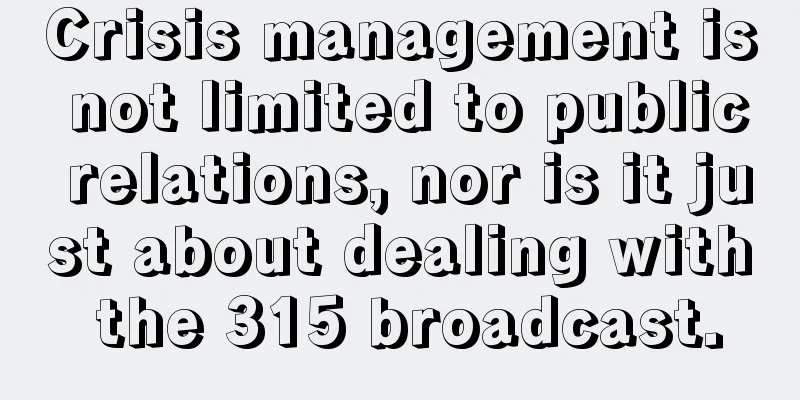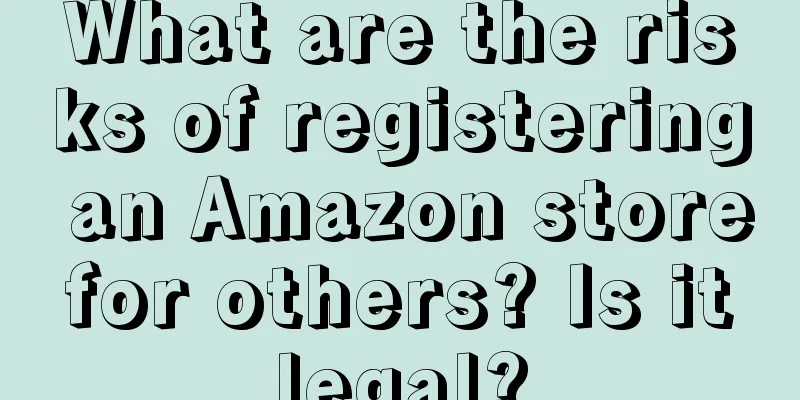Crisis management is not limited to public relations, nor is it just about dealing with the 315 broadcast.

During the 315 period, there were a lot of crisis public relations related content in the circle of friends. Some people emphasized the importance of crisis public relations, such as "With public relations, I can feel at ease on 315", and some people were glad to have passed another hurdle, such as "I can rest assured for now and will continue to work hard next year". This reflects that many people still equate crisis management with crisis public relations, limit the responsibility of crisis management to public relations personnel, and only regard March 15 every year as a crisis management period. However, such a perception will plant a huge risk for the healthy development of the brand. 01 Crisis management is everyone’s responsibilityEnterprise operations involve complex internal and external affairs such as personnel, administration, legal affairs, procurement, production, sales, customer service, etc. Problems in any link may evolve into a crisis. At the same time, all employees of an enterprise are a community of interests, and the safety of the enterprise is directly related to their gains and losses. Therefore, crisis management is not only the responsibility of public relations personnel, but the responsibility of all members. The process of building a successful brand is difficult and long, but a crisis can ruin a brand in a moment. Business owners and senior professional managers must constantly improve their crisis management awareness and capabilities, and strengthen crisis management awareness among all employees through daily lectures and special studies. The crisis awareness of all employees can make everyone mentally prepared to deal with various crises. On this basis, the company can eliminate potential risks, detect crises in a timely manner, and respond to and deal with them in a timely manner by establishing a crisis management work system and providing relevant training for employees to continuously improve their response capabilities and integrating crisis management work into the daily operations of the company. 02 Establish a complete crisis management systemEnterprises need to establish a complete crisis management system to make it clear to everyone how to perform their respective duties. The crisis management system should at least include the establishment of crisis management personnel, crisis classification and response plans, crisis monitoring system and other systems. These systems are not independent of each other, but are interrelated and operate in coordination. The establishment of crisis management personnel should clearly define the crisis management responsibilities that senior executives, middle-level managers, and front-line employees should assume in different departments and positions, and how they should communicate and cooperate in different crisis situations. Crisis classification and grading need to be classified and graded according to regulatory laws, production methods, sales methods, etc., so that enterprises can formulate corresponding plans according to different crises; crisis response plans should be pre-prepared disposal plans for crises of different types and levels, and clarify the corresponding management departments, communication mechanisms and disposal measures, etc. Enterprises can activate the plan as soon as the crisis occurs and respond reasonably to minimize the negative impact. The crisis monitoring system includes the public opinion monitoring system, production safety monitoring system, product quality control system, customer complaint system, etc., which can help enterprises detect crises as early as possible and deal with them in a timely manner to prevent them from evolving into a larger crisis or spreading into a public opinion crisis. After the crisis management system is established, the company should formally release and implement it in the form of a document, and run it through learning and training, actual operations and assessment and evaluation, so that it becomes a part of daily work. 03 Further strengthen crisis prevention and control work during critical periodsDuring major periods such as 315, IPO, mergers and acquisitions, and restructuring, companies should further strengthen crisis management, more proactively eliminate potential risks, and properly handle crises in a timely manner to minimize damage. Strengthening mechanisms for crisis prevention and control during critical periods After the monitoring system discovers a crisis and issues an early warning, the crisis management team must act quickly and develop an appropriate handling strategy after gaining sufficient information. It must identify stakeholders on the premise of defining the nature of the conflict. In addition to quickly issuing a statement to express a responsible attitude, it must also take practical actions to resolve the problem in order to gain the understanding and support of stakeholders. During this process, companies should attach importance to close communication with government regulatory authorities and keep in step with them. They should not lose official understanding and support due to hasty response and should ensure that they do not make more serious political mistakes and trigger a bigger crisis. In the process of crisis management, it is very important to maintain appropriate contact with the media. Enterprises need to use the media to achieve relative transparency and timely transmission of information. This requires enterprises to maintain good media relations. When negative events occur, on the one hand, they must ensure the legitimate rights of media supervision, and on the other hand, they must avoid misunderstandings that may lead to greater public opinion crises. The company must speak with one voice, release information through spokespersons, and then pass it on to consumers and the general public through the media, actively guiding the public opinion environment to create a favorable environment. In particular, it is necessary to avoid attacking the media and avoid triggering a collective attack from the media. The best crisis management is to prevent a crisis from happening. Although this is idealistic, companies need to work hard to improve internal management and strengthen external risk management to minimize the risk of crises. 04 Improve internal management level and eliminate potential risksBusiness operations involve many internal and external factors, and it is difficult to guarantee that there will be no negative problems. However, crises caused by poor internal management (such as product or service quality problems, violation of laws, or environmental pollution, etc.) should be avoided. Enterprises need to continuously strengthen internal management, eliminate their own potential risks, and reduce the occurrence of crises. Enterprises must strictly abide by the bottom line of laws and regulations. To this end, they must establish a good corporate culture, act in a responsible manner towards consumers, partners, and the general public, strengthen internal management in all aspects such as production, sales, and services, continuously eliminate hidden risks, and pay special attention to ensuring the quality of products and services. Enterprises should actively apply innovative technologies and scientific management methods to empower internal management, such as improving production processes to improve quality, strengthening quality inspection, enhancing humanistic care for employees, strengthening environmental protection management, etc., so as to reduce the possibility of risks when interacting with stakeholders. 05 Strengthen external risk management and avoid getting involvedCrises that occur in external suppliers, distributors, customers, and friendly companies are likely to spread and become crises of the company itself. In 2008, the toxic milk powder incident caused heavy losses to domestic large dairy companies such as Yili and Mengniu; in 2022, the "earth pit pickled cabbage" exposed by CCTV's 315 Gala caused Uni-President and Master Kong to be deeply involved in the whirlpool of public opinion because of the involvement of suppliers. There are many such examples. Therefore, companies should strengthen external risk management and try to avoid being involved. Enterprises should strengthen the management of the supply chain. For example, they should establish a strict access system for suppliers and distributors, conduct strict examinations on their qualifications, corporate credit, violation history, etc., and be cautious in admitting or refusing entry to those with problems; establish a corresponding management assessment system, strengthen quality inspection and business supervision, and not only terminate cooperation with serious violations, but also strictly hold them accountable or retain evidence to prepare for future troubles. Enterprises should establish an efficient communication and coordination mechanism with their partners. According to the differences in the content of cooperation and the importance of the cooperative relationship, enterprises should determine the contact persons at different levels in different departments within the company, maintain appropriate frequency of communication and exchanges with partners, and jointly correct problems in a timely manner. When a partner encounters a crisis, the enterprise should communicate in a timely manner to obtain sufficient information to provide reference for the formulation of a crisis handling strategy, and then take appropriate measures to cut off the crisis. Enterprises should maintain good relations with industry associations and government departments. When a crisis occurs, enterprises can seek help from associations. Especially when an industry crisis occurs, enterprises should not act rashly and alone. It is safer to communicate with industry associations and then make decisions in a consistent manner. In addition, the attitude of relevant government departments often plays an important role in the development of the crisis. If enterprises can obtain relevant information through good communication, it will naturally be beneficial to deal with the crisis. 06 ConclusionCrisis management is a systematic project that is not limited to crisis public relations, nor is it just about dealing with the March 15 period every year. Companies need to enhance the crisis management awareness of all employees, build a complete crisis management system, control the impact of crises at a reasonable level on a daily basis, and further strengthen crisis prevention and control work during critical periods; in addition to handling public opinion crises, they must also improve internal management levels to eliminate their own potential hidden dangers, strengthen external risk management to avoid being involved, and safeguard the healthy development of the brand. Author: Chen Hao; WeChat public account: Brand Market Relativity (ID: Brand-Marketing) |
<<: Special Forces Tourism: Breaking the Curse of Formalism with Unyielding Courage
>>: The "big business" hidden in young people's niche hobbies
Recommend
What does it mean when eBay is restricted? How to deal with it?
The entry threshold of eBay is relatively low, and...
How do Shopee sellers log in? What is the reason for being unable to log in?
Now more and more people are starting to shop on t...
Can the monthly rent of Amazon store be refunded? How to refund?
If you open a store on Amazon, you need to pay a m...
What to do if no one clicks on your article? 5 suggestions for new media operators!
As a new media operator, we often think about a qu...
What are the techniques for Amazon distribution? What are the differences between Amazon distribution and boutique products?
In today's e-commerce field, Amazon, as one of...
With over 200 million views and 3 million followers, has traditional culture become the darling of short video traffic?
Traditional culture has always been a traffic sour...
How to edit Amazon listings? What are the tips?
As a novice Amazon seller, learning the editing sk...
Do copywriting that ChatGPT cannot replace
This article starts with the underlying logic of C...
An in-depth analysis of the warehouse membership store model to see the competitive cards of Costco, Sam's Club, Fudi and other players
Under the shadow of Sam's Club, which is a &qu...
How to activate Wish? What are the conditions?
With the rise of cross-border e-commerce, more and...
How much does it cost to register on Shopee's cross-border e-commerce official website? How to open a store?
Domestic merchants who want to join Shopee must fi...
Why is there so few orders on Shopee? How to solve it?
In fact, there are many sellers in the market like...
How to apply for Shopee if you have never opened a store?
The official regulations require that you must hav...
Can Wish be made without a source of goods? How to do drop shipping?
Some seller friends plan to open a store on the Wi...
Pay or earn money, how to tell the difference?
Are these paid knowledge products such as "Te...









